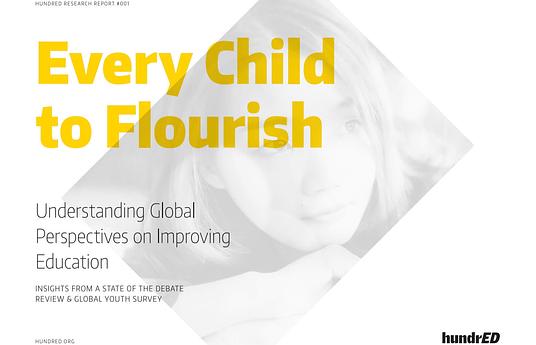On World Mental Health Day, Jessica Spencer-Keyse, former Head of Global Research, reflects on what the research shows about mental health and wellbeing in school – and how to support every child to flourish.
In our complex ecosystem of education, HundrED’s research team have sought to understand what stakeholders perceive really needs to improve across its spectrum. It can be difficult and overwhelming with so little information and so little time to make sense of what can help. Our aim was to comprehend what exactly is important to people today in K12 so we can research the best solutions worldwide.
To do so we reviewed the current state of education considering sources from academic research to blogs, social media, and reports. Alongside this, we conducted our own survey of hundreds of young people from 19 different countries to find out what children really think of their own education. A key finding from this work showed that over 50% of young people today desperately want to understand and improve their mental health within their education. Bursting with insight, many students went on to share their thoughts in additional comments on this topic, confirming its importance and clarifying their concerns.
Unfortunately, research today highlights that children and adolescents worldwide are becoming increasingly anxious and depressed. This is a global epidemic, as 10-20% of children and adolescents experience mental disorders, with half of all mental illnesses beginning by the age of 14. Many of our other findings also indicate factors that could be inadvertently causing anxiety and stress. Over 80% of young people, for example, truly believe that their education needs to significantly improve when preparing them for their future and career. As research shows humans prefer certainty to uncertainty, it’s important to consider this in the framework of wellbeing too. With so much uncertainty for their future, it’s crucial we strive to reduce young people’s anxiety by ensuring they feel ready for their next stage in life.
“I believe that if we had opportunities to understand our future careers we would be more engaged in school activity, but we only get 1 day/limited information to understand our careers more. I understand that we have the resource of the internet but sometimes it’s better to have more options/understanding on potential careers, real time.” - 15, Male, Educated in United States, Hispanic
On the positive side, the latest research is also helpful for demonstrating the ways we can promote and develop healthy mental wellbeing. Key factors, based on the Mental Health Foundation’s research indicate, for example, how to improve young people’s wellbeing which includes:
-
Being in good physical health, eating a balanced diet and getting regular exercise
-
Having time and the freedom to play, indoors and outdoors
-
Going to a school that looks after the wellbeing of all its pupils
-
Taking part in local activities for young people
-
Feeling loved, trusted, understood, valued and safe
-
Being interested in life and having opportunities to enjoy themselves
-
Being hopeful and optimistic
-
Being able to learn and have opportunities to succeed
-
Accepting who they are and recognizing what they are good at
-
Having a sense of belonging in their family, school, and community
-
Feeling they have some control over their own life
-
Having the strength to cope when something is wrong (resilience) and the ability to solve problems.
So, considering the list above, is your school or learning environment supporting young people to flourish?
What changes would you make knowing that the above all contribute to optimal wellbeing?
On the dawn of World Mental Health Day, I find myself reflecting on these stark and important questions and findings. In both research and conversation, this theme is beginning to arise again and again, particularly from young people worldwide. So what can education stakeholders do to address this?
“For my education, I think my mental health is the most important thing. If I learn a lot but my mental health is not good, I still won’t be happy.” - 13, Male, Educated in Taiwan, Hokkien
Research to Action
To support optimal mental health and wellbeing we must strive for a truly holistic, collaborative approach. Fortunately, many educators and innovators worldwide are already working tirelessly to ensure wellbeing is at the center of our learning environments and education systems.
Approaches range from implicit ones, such as building a school culture that creates a safe and supportive environment, to explicit mindful and social-emotional practices, such as Roots of Empathy. When showcasing examples of impactful innovations at HundrED, we ensure that all selected put the child first, and in doing so, put wellbeing at the center.
We understand that it can feel overwhelming as an educator to broach mental health, but it’s encouraging to know that improvements can sometimes come from the most unexpected places. Global phenomenom Times Tables Rockstars has ensured, for example, that students’ confidence and joy is right at the center of a new approach to numeracy. There’s also the rapidly growing Forest School movement which ensures children have the opportunity to immerse themselves in nature and play outdoors, while the Daily Mile creates time in the day for exercise - all of which contribute to optimal wellbeing!
Wellbeing also arises from increased autonomy and strong relationships. A focus on personalized learning and social-emotional techniques empower young people to have control over their own life through school models such as Geelong Grammar School, 5 Areas of Development and Big Picture Learning. Furthermore, their focus on building strong relationships with young people builds a firm foundation for wellbeing. Over ⅙ of the comments in our latest report shared the importance of authentic relationships between students and staff.
Alternatively, educators can also consider and utilize micro-solutions that focus on specific aspects of improving mental health, using apps such as Smiling Mind, which aims to support children to deal with the stress and challenges of daily life. Their goal is for mindfulness to be officially on the Australian national curriculum by 2020 (they launched Australia’s first mindfulness curriculum in May this year).
Another great example is MeeTwo, created by a psychologist and an educational technologist in collaboration with UK teenagers. They’ve created a discrete and ‘easy to access’ peer support service which reassures users that they are not alone in what they’re feeling and experiencing. Receiving help virtually is particularly beneficial for those who experience social isolation and anxiety. Tools like these can be a useful addition to support a healthy learning environment or tools for teachers who want to make a change today.
With growing evidence and awareness of mental health increasing, it’s key that we consider the ways our education systems and learning environments can play a critical role in supporting optimal wellbeing. On World Mental Health Day let’s strive to put wellbeing at the center of education in 2018 and beyond so everyone in school, whether adult or child, can learn to flourish.
Download HundrED's report 'Every Child To Flourish', for free, at hundred.org/en/research #EveryChildtoFlourish #WorldMentalHealthDay




